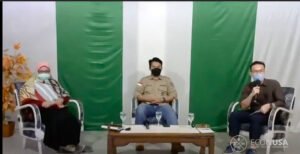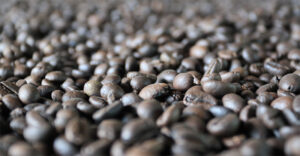
COVID-19 pandemic does not merely affect health aspect, but also entire aspects of human life. Food security across Indonesia has been severely impacted by the condition including West Papua Province.
Disrupted food production and logistic distribution due to massive social distancing has partly led to the limited food stock. To date, Papuan peoples have currently shifted their consumption to rice as their staple food instead of local foods such as sweet potatoes, cassava, taro, and sago.
Responding to the situation, West Papua Governor, Dominggus Mandacan, called peoples in West Papua to utilize their lands to plant various local foods. His call was made in anticipation of foods crises that might happen due to the COVID-19 pandemic.
Dominggus made his statement at Muari Village, Oransbari District in South Manokwari Regency on 11 May 2020 on his inauguration event on Village Food Security through Local Food Cultivation. The event concerned with the local village’s food supply in anticipation of COVID-19 in West Papua Province. This evidently showed that West Papua has land for local food production cultivated independently by the whole communities in West Papua.
At the same time, Dominggus also harvested field paddy at Oransbari District and he pledged to make Oransbari as the food stock as an effort to achieve self-reliant rice production. Oransbari District with 645 hectares of paddy fields is estimated to produce around 1,200 tons of rice of one crop momentum.
“Let us make Oransbari District in South Manokwari as the food stock towards a self-reliant rice producer in West Papua,” said Dominggus in his speech.
As to him, both local food and field paddy need to be optimized to suffice food supply. The enforcement of food security must not simply ensure the provision of rice but also local food resources. When both aspects are maximized, West Papua Province could help the government afford food supply.
Making use of the land surrounding residences to cultivate local food, the community has indirectly participated in food security development or community resilience so as to suffice their own needs for foods. So to speak that the region would not depend on food stock from other parties. The most important thing is that the community should not be trapped into poverty due to the current uncertain situation.
On the other side, Yanuarius Anouw, Deputy Director of Bentara Papua, through an online discussion on “Building Local Resilience” said that community across regions in Papua has currently cultivated their land. In Manokwari, the community has been actively planting cassava, taro and vegetables. Besides, they also study organic farming, planting media and organic fertilizer production. Meanwhile, the local cooperative and collaboration with the community have been drawn on to channel the marketing of those local crops.
In addition to building community resilience on food and income, Yanuarius said that this is either done to build the spirit of the villagers to stay productive by cultivating unattended land by producing their own food amidst the pandemic.
In a bid to provide support to West Papua Province in its endeavor to build local food resilience, EcoNusa Foundation also organizes some programs to Papuan community. EcoNusa jointly with its partners has built local commodity networks and food security at indigenous community level through community-based business development and marketing connectivity strategy.
EcoNusa has encouraged the management of local commodity among the indigenous community in sustainable manner emphasizing local wisdom principles so as to ensure peoples’ welfare while utilizing and protecting rainforests and sea ecosystem functions.
It has provided assistance for local commodity management both directly and indirectly by targeting 150 local community initiatives in the Eastern Indonesia. The assistance is expectedly to give benefits to more than 1.5 million native communities of Papua and Maluku.
In collaboration with the local government and villages, nongovernmental organizations, village-owned enterprises and private sectors, EcoNusa has taken parts in promoting local commodity management by the indigenous peoples. EcoNusa also mediates village-based government programs such as village fund, social forestry and small and medium enterprises (SMEs). Besides, EcoNusa has either built networks for local commodity supply to meet more extensive markets. And so, the local commodity could not only suffice their own needs for food but also their sources of income by selling to other markets outside their regions.
The supports provided by EcoNusa are expected to build community resilience in the Land of Papua by utilizing their resource-rich environment, their available land and local food resources as valuable commodities. The community is endorsed to have food security, particularly amidst the current uncertain situation due to the pandemic.
Editor: Leo Wahyudi







